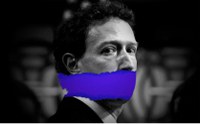How Zuckerberg censored Covid on Facebook
How Zuckerberg censored Covid on Facebook
Mark Zuckerberg has said Facebook and Instagram were wrong to censor posts about Covid during the pandemic and that the company should have fought pressure from the Biden administration.
In a letter to a US committee investigating online content moderation, Mr Zuckerberg said senior White House officials “repeatedly pressured” the company after Joe Biden was inaugurated in 2021. He said that Facebook “made some choices” that it would not have made today.
As reported by The Telegraph, tensions with Facebook had been brewing for months before Joe Biden brought the row into the open three years ago. The report continues:
In Britain and America, government departments had privately put pressure on Mark Zuckerberg’s social media giant to limit the spread of anti-vaccine posts or messages questioning Covid’s origins.
Then in July 2021, the US president went public.
“They’re killing people,” Mr Biden told reporters when asked about the spread of anti-vax messages, before repeating the claim for emphasis. “The only pandemic we have is among the unvaccinated. And they’re killing people.”
Mr Biden’s comments, which he later backtracked on, marked a low point for relations between Facebook and the White House. In a group WhatsApp chat between Mr Zuckerberg and other top executives, Sheryl Sandberg, Facebook’s chief operating officer, vented.
“Ugh on Biden today,” Ms Sandberg wrote, according to messages recently released by a Republican-controlled US House committee. “I think they are scapegoating us to cover their own missed vaccination rates and a virus they can’t get control of.”
Sir Nick Clegg, former deputy prime minister and Facebook’s lobbying chief, wrote: “The behaviour of the [White House] over the last 24 hours has been highly cynical and dishonest.”
Ms Sandberg – an avowed Democrat – even compared the Biden administration’s actions unfavourably to Trump’s White House.
“Did Trump say things this irresponsible? If Trump blamed a private company, not himself and his government, everyone would have gone nuts,” she wrote.
The frustration was understandable. White House officials had berated Facebook executives, including Sir Nick, about what they saw as the company’s failure to cooperate with the Biden administration’s Covid response. But Facebook claimed it did regularly cooperate.
In one case it demoted a video of the Fox News host Tucker Carlson questioning the effectiveness of vaccines after an angry email from Rob Flaherty, White House digital strategy director, despite the video not breaking Facebook’s rules.
Later, staff brainstormed what more they could do to crack down on Covid posts, citing “the continued criticism of our approach from the US administration”.
In one case, Sir Nick refused to take down a meme featuring Leonardo DiCaprio joking that in 10 years those who had taken the vaccine could be entitled to compensation.
Sir Nick said that Andy Slavitt, the White House’s senior Covid-19 adviser, was “outraged” that the joke post was not removed.
While less forthright, British politicians also put pressure on Facebook to toe the line.
The Telegraph’s Lockdown Files investigation revealed that Matt Hancock, the former health secretary, sent Sir Nick a WhatsApp saying: “Your team have been working really well with the department and the advertising ban is great – but we need to have a timeframe for removal of anti-vax material and how to demonetise.”
Sir Nick wrote back, “I’ll look into this”, before responding a month later by saying Facebook would delete posts making false claims about vaccines.
Meanwhile, the government’s secretive Counter Disinformation Unit was busy monitoring posts critical of lockdowns or vaccine passports. Through the Department for Digital, Culture, Media and Sport, it enjoyed “trusted flagger” status that allowed requests for content removals to be fast-tracked.
Worth reading in full.
This article first appeared on the Free Speech Union of the UK 's website with which the FSU SA is associated. The author is Frederick Attenborough


